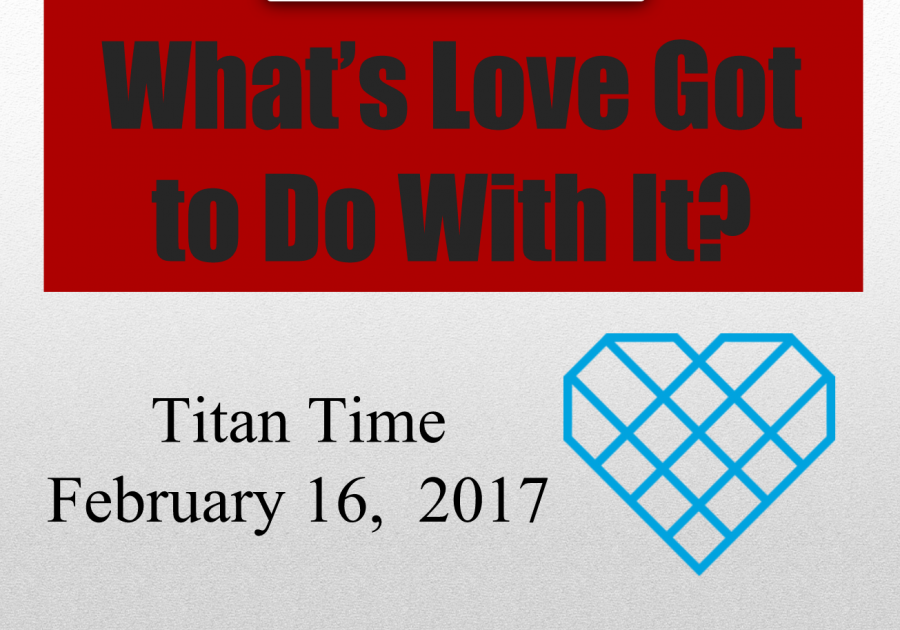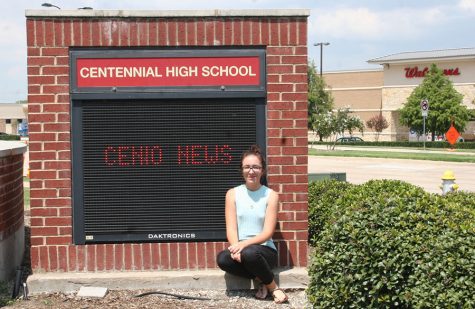What’s Love Got to Do With It?
February 17, 2017
Valentine’s Day, prom, spring flutters; indeed, love is the air. High school sweethearts are seen walking the halls, hand in hand, feeling as though nothing matters but each other. However, when does a relationship go from butterflies in your stomach to a feeling of anxiety and dread? Where does love cross the line into obsession and control? And how many of us know the signs?
During the sweetest time of the year, it is important to call attention to the difference between healthy and unhealthy relationships. This week’s Titan Time played a huge role in teaching students the difference and teaching what red flags to look for that might turn your true love into a nightmare.
Student Assistance Coordinator Allene Byroad, the creator of this week’s Titan Time, says in order to have a healthy relationship you must first be healthy yourself.
“I think the first thing you need to ask yourself before getting into a relationship is ‘am I in a good place with myself,'” Byroad said. “If you’ve got issues, whether it’s jealousy or you’re still really hurt from your last relationship, you’re probably not ready to get into something else. It’s hard to enter a relationship and give your best if you’re hurt and angry.”
Part of being in a good place is knowing your boundaries.
“You need to really spending time thinking about what is acceptable for me,?” Byroad said. “What am I going to tolerate? What are my standards? We all deserve to have boundaries that keep us safe and healthy, and we’re worth worth fighting for those.”
Byroad says she sees a lot of students have a mentality of “I have to have a boyfriend or girlfriend,” and because of it, are willing to tolerate more, something she says is the wrong approach.
“You need to get yourself off the clearance rack and put yourself behind glass where the precious things are and say this is where I belong,” Byroad said. “We almost have to teach people how we want to be treated, and only then we can enter into this ‘I’m ok, how can I help you be the best? How can I support you? How can we grow from each other but still maintain ourselves?’ And that’s the key.”
Rather than growing from each other, on the other hand, signs of an unhealthy relationship include put-downs, obsessive control, anger, disrespect, and isolation from friends or family, to name a few.
“The most prominent sign of a bad relationship we tend to hear in high school is control,” Byroad said. “‘Give me your cell phone password, let me check and see who you’re texting, who were you walking down the halls with, who were you talking to.’That ‘I have to know what you’re doing,’ and that is so unhealthy. And really it comes from a place of ‘I’m really not ok with me.’ If I have to be that controlling to you, that means I don’t trust you. So either I need to end it because you’re doing something that I can’t trust, or I have trust issues myself.”
A good relationship, on the other hand, should involve honesty.
“A healthy relationship should look like ‘ I going to believe the best in you unless you prove otherwise,’” Byroad said. “It’s two people who are not only in a good place themselves but they are supportive of each other. And rather than ‘what can you give me’ it’s ‘how can I help you be the best you can be.’”
Byroad says there are many causes of unhealthy relationships, including TV, social media, and a lack of role models with healthy partnerships.
“In society and in entertainment, we see all kinds of physical, mental, emotional and sexual violence,” Byroad said. “And for some of us, we maybe haven’t seen it growing up, or we haven’t had the kind of discussions with people we needed to have. I don’t think there has been this ‘this is how we should treat one another, this is not acceptable, this is a red flag, you don’t have to put up with this and you shouldn’t.’ It needs to be addressed.”
The multitude of unhealthy relationships extends beyond high school into college, and it is this feeling of being thrown into a completely different world that is another cause of the abuse.
“So many teenagers go off on their own, go off to college, go off and get a job, and they’re sort of thrown into this new world and want to be a part,” Byroad said. “They want to find new friends, they want to be popular, but they’re thrown into all of this and they’re trying to find their way. And if they don’t have a good foundation of who they are, it’s very easy to get involved in a situation where you don’t know how to get out.”
The problem is more alarming than most of us think, as according to Titan Time, one in three women in the United States will be in an abusive romantic relationship during their lifetime, as will one in four men.
“This is a national epidemic,” Byroad said. The powerpoint talks about how it’s a national epidemic. When you’ve got statistics like that, it’s a big problem. Society kind of acts like you guys are supposed to know how to treat one another, and I don’t think there’s a lot of instruction and a lot of help. That needs to change.”
Byroad says statistics like that are the reason Titan Time is so important, and programs and education are one of the main ways such numbers can be brought down.
“I think we have to stop assuming that kids know how to treat one another and how to be treated and I think we have to help teach them,” Byroad said. “I think we just have to keep making people aware of what is love vs what is not love. We just have to keep showing them.”
Despite all of this, Byroad urges students not to shy away from getting into a relationship.
“It’s important for high school kids to be involved in relationships because that’s the beginning of helping you find out who you are,” Byroad said. “You have to learn by trial and error and learn how to communicate, how to bring something up if it’s bothering you. If you don’t date, you don’t have those experiences, so I think it’s a good thing for high school students to be dating. But there are lots of high school students who choose not to date, and that’s ok too, but I would hate for a kid to say I’m not going to date because I’m afraid to be hurt.”
However, if you fear trouble in paradise, one of the best things for to do is talk to someone, such as a teacher, counselor or Byroad herself.
“I would encourage a person in such a situation to talk to somebody more than just a friend, because friends are there to help but may not always know what to say,” Byroad said. “I would encourage them to talk to an adult that they trust, such as a teacher that they feel really close to, if they’re close to a parent, or an aunt or uncle. That adult can kind of guide them a little bit better than a friend.”
She advises people who may be stuck in a bad relationship to pay attention to their gut.
“If something is bothering you, if something seems off, you need to take this seriously, because your gut is trying to tell you something,” Byroad said.
Bystanders who see off behavior also should speak up.
“Talk to the person that seems to be the victim and let them know if you’re seeing or hearing something that does not look like love,” Byroad said. Ask them, ‘why are you ok with that? You deserve better.’ That being said, you can’t always help somebody, if they don’t want help, but I think you need to let them know that you’re seeing or hearing something that does not look or sound like love. And that you’re doing this because you care.”
Learning the difference between an healthy and unhealthy relationship is one of the most important topics to learn, especially in high school, and is a topic the state of Texas requires to be covered in schools every year. Despite this, the topic and topics of Titan Time in general are not always done justice.
“I worked really hard on this presentation, and I’m passionate about it because I see it and I talk to kids who are hurting,” Byroad said. “I think these programs can only be as good as the teacher who’s willing to invest the time in preparing for it. There are teachers who aren’t willing to take the time, but I’ve been trying to let them know that this is important.”
Byroad hopes at least a little part of this crucial lesson will come through to students, and is able to teach them the difference between high school sweethearts and high school sorrows.
“There are kids who are going to be willing to sit and listen because they care, and there will be kids that no matter what is presented and how, are going to seem disinterested,” Byroad said. “I keep hoping that even for those kids, that if they hear one thing, and see one thing such as this is an example of control, this is an example of jealousy, it makes them think, ‘that’s kind of what my girlfriend or boyfriend does to me.’ And it is this realization that something needs to change that makes teaching it all worth it.”
If you or someone you know is going through an unhealthy relationship, whether it’s a gut feeling or something is seriously wrong, don’t ignore it. Please check out the following websites if you need help or want more information:
You can also check out the Titan Time PowerPoint: https://docs.google.com/presentation/d/1_h1EVwxjxukGuQ_EOeoOpEj-jiFOEIHmZPgW-uTUpBI/edit#slide=id.p4



